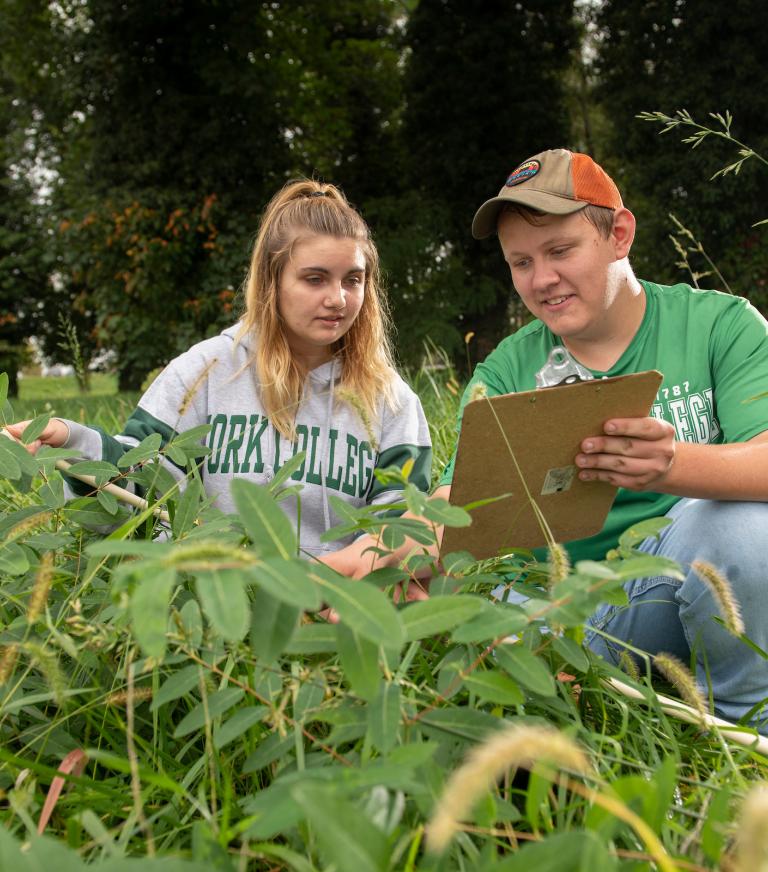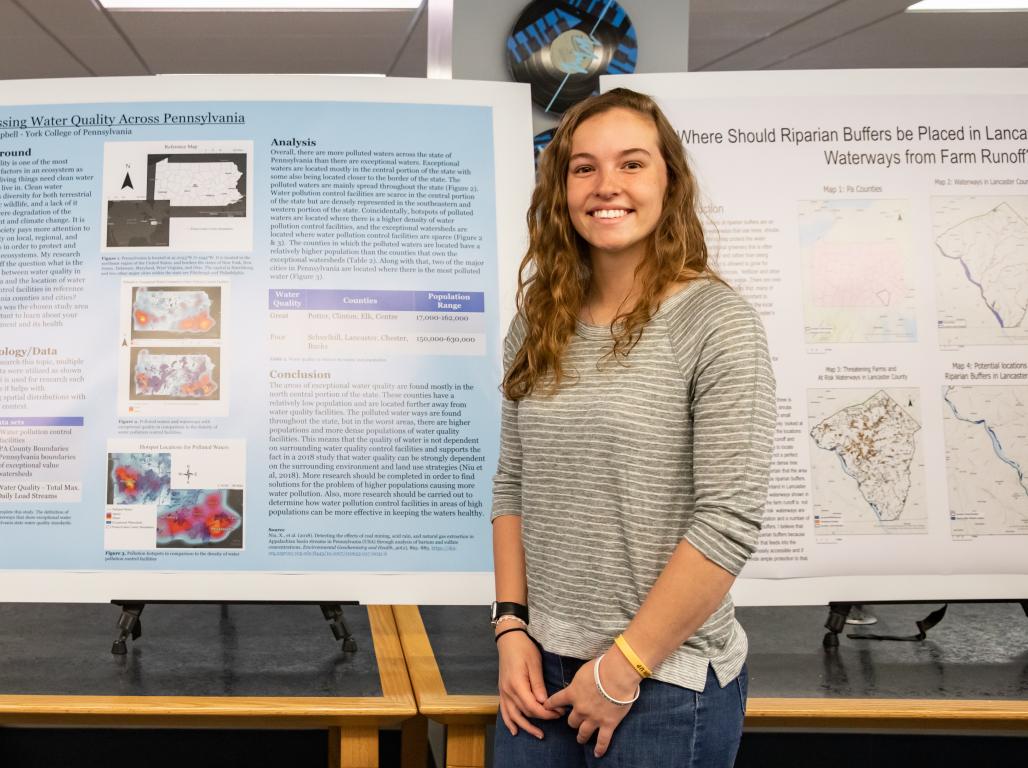Environmental Science

Program Type
B.S.
Est. Time to Complete
4 years
School
Kinsley School of Engineering, Sciences and Technology
Delivery Mode
On Campus

Learn how to shape a sustainable world as an Environmental Science major.
York College of Pennsylvania's Bachelor of Science (B.S.) in Environmental Science degree program blends science and sustainability as you concretely prepare for an impactful career addressing issues in agriculture, forestry, sustainability, policy, and public health.
As an Environmental Science major at York College, you explore the ways humans interact with the environment and study how that interaction manifests in all of the fundamental sciences: biology, ecology, chemistry, and physics.
With multiple field and internship opportunities and access to local lakes, wetlands, fields, and forests, gain the practical experience to enter a career in the quickly expanding field of environmental science.
About the Bachelor of Science in Environmental Science
Environmental Science Degree Requirements
The Bachelor of Science in Environmental Science degree program curriculum teaches key environmental science concepts and theories through in-depth lectures, hands-on lab experiences, engaging field trips, and more.
York College designed this 120-credit bachelor’s degree to incorporate 23-29 credits of electives that allow for exploration into areas like conservation biology, animal ecology, genetics, and sustainable engineering.
Courses
Some of the key courses for the Environmental Science major include:
- BIO 152: Evolution, Ecology and Diversity
- BIO 212: Environmental Biology
- PSY 215: Sustainability and Psychology
- SOC 301: Environmental Sociology
- BIO 404: Ecological Action
Admissions and Aid
Begin your journey into the dynamic world of environmental science. No matter the time of year, we welcome new students on a rolling basis. Start your application today.
If you need assistance or have questions, our York College Admissions Team is ready and eager to support you every step of the way. Contact us with questions.
Explore undergraduate admissions and review tuition and aid information.
Earn a B.S. in Environmental Science at York College of Pennsylvania
York College’s Environmental Science major program empowers you to transform your passion for the environment into a rewarding career.
Ready to safeguard our planet? Request information today.
Excel in Careers in Environmental Science
The Bureau of Labor Statistics anticipates a strong growth in the demand for professionals skilled in analyzing environmental issues and developing innovative solutions. Those who have graduated with our B.S. in Environmental Science have successfully pursued careers in various areas, including research, education, lab work, and on-site roles in environmental organizations and government agencies.
Students with a B.S. in Environmental Science can explore careers encompassing:
- Ecology
- Environmental education
- Wildlife management
- Conservation biology
- Sustainability
- Climate change policy
- Environmental health and safety
Our Environmental Science majors acquire a comprehensive understanding of scientific principles, along with insights into societal, cultural, and economic factors. This combination equips them for influential roles in industrial and commercial laboratories, as well as positions in design, sales, consulting, and fundraising for environmental projects.
Prepare for Graduate Studies
Fields such as renewable energy, environmental policy, and education call for a graduate degree as the next step toward career advancement, leadership, and more technically advanced positions in environmental science.
At York College, we leverage internship experiences, undergraduate research opportunities, and deep collaboration between faculty and students to best prepare those interested in applying for graduate school immediately or a few years in the future. Plus, during application cycles, students can get help with their résumé, application, and letters of recommendation.
Environmental Science Degree Salary Outcomes
Students graduate from the bachelor’s in Environmental Science program qualified to pursue roles performing environmental testing and developing solutions to complex environmental problems. According to the Bureau of Labor Statistics, these positions fetch the following median annual salaries (like any profession, earning potential varies depending on role, location, level of experience, and other factors):
- Conservation scientists and foresters—$69,060/year
- Environmental scientists and specialists—$80,060/year
- Environmental science teachers, college-level—$81,060
Environmental Science Internships
At York College, we value hands-on learning as a core part of your education. The B.S. in Environmental Science degree offers you the opportunity to engage in real environmental projects in an off-campus internship.
Ranging from private companies to local government agencies, internships in the Environmental Science program strengthen your confidence, expand your understanding of the field, and connect you with future employers.
Explore internships at York College.
On-Campus Environmental Sustainability Initiatives
Multiple entities on campus, from the President’s Task Force to sustainability education programming, help execute our dedication to action in sustainability. York College also contributes to the Association for the Advancement of Sustainability in Higher Education (AASHE)’s Sustainability Tracking, Assessment, and Rating System (STARS) Report.
As an Environmental Science major, you have ample opportunities to support on-campus sustainability initiatives, attend guest lectures, and participate in the campus stream environmental restoration project.
Field and Laboratory Technology
Environmental Science students utilize various devices and equipment while participating in field experiences as part of their coursework. These are the same ones that they encounter in their future professional field and laboratory settings.
During the program, students acquire hands-on experience in laboratory techniques, and our knowledgeable faculty teach them how to use the latest technology in York College’s advanced laboratories. Along with Biology, Chemistry, and Computer Science labs, the Naylor Ecological Building serves as a central location for hands-on experience.
Explore Kinsley School of Engineering, Sciences, and Technology.
Mentored Research Opportunities
Completing research as an undergraduate is crucial for those who want to pursue graduate degrees in environmental science and related fields. At York, we empower Environmental Science majors to conduct research in collaboration with a faculty mentor.
This experience acquaints students with the practical and theoretical aspects of discovering new knowledge in important areas such as sustainability, water quality, and climate change policy through research design.
Academic and Extracurricular Clubs and Organizations
York College has a wide variety student clubs and organizations of various interests, sizes, and purposes. Organizations range from academic honor societies to Greek living, from drama to publishing, from exploring cultures to joining student government.
- Beekeeping Club
- Plant and Gardening Club
- Women in Science and Engineering (WISE)
Apply Your Skills Across Multiple Careers
The B.S. in Environmental Science from York College prepares graduates for a diverse range of careers, from research and leadership to sales and public policy, thanks to a flexible program that allows for personal exploration in areas ranging from computer science to sustainability.
The Environmental Science degree equips students with an in-demand skill set, including:
- Conducting ecological research to contribute to scientific advancements and conservation efforts
- Observational skills developed through lab and fieldwork, crucial for data collection and ecological study
- Utilizing math and statistics to solve environmental problems and interpret complex data
- Effective communication of scientific findings and theories to inform and engage various audiences
- Expertise in Geographic Information Systems (GIS) for practical applications in environmental management
- Critical thinking developed to integrate science with social, ethical, and policy considerations to assess and address environmental challenges
Environmental Science Courses
Your class schedule will include core courses for your major, Gen Next general education classes, and electives.
| Course Name | Course Code | Credits |
|---|---|---|
| Evolution, Ecology, and Diversity | BIO 152 | 4 Credits |
| Environmental Biology | BIO 212 | 3 Credits |
| Sustainability and Psychology | PSY 215 | 3 Credits |
| Ecological Action | BIO 404 | 4 Credits |
Careers in Environmental Science
A bachelor’s degree in Environmental Science opens up a variety of career opportunities. Some of your options may include:
Ecologist
Wildlife Biologist
Water Quality Specialist
Environmental Restoration Planner
Research Scientist
Land Manager

Build your dream career, one day at a time.
This is day one. From your first semester on campus through graduation day, York College offers expert advice, professional development opportunities, and personalized support to help you navigate the choices that influence your future.
Explore resources for a successful college experience:
Frequently Asked Questions
With an environmental science degree, you can pursue careers in environmental consulting, conservation, sustainability, environmental education, wildlife management, government policy, and more.
Environmental science majors typically include laboratory training and coursework in various scientific disciplines, including chemistry and physical science. This opens doors to both hands-on fieldwork and positions in corporate or government settings that influence environmental strategies.
To establish a career in environmental science, a bachelor's degree in environmental science or a closely related field such as biology, chemistry, physics, geosciences, or environmental policy is generally necessary. This foundational education equips you with the interdisciplinary knowledge needed to address complex environmental issues.
For those aspiring to specialize further, earn greater salaries, or pursue leadership roles, a master's or doctoral degree may be advantageous and is often required for advanced research or academic positions.
Absolutely. Earning a bachelor's degree in environmental science is a worthwhile investment. A bachelor's in this field provides you with a versatile skill set that is not only valuable in specific environmental careers but also transferable to many other sectors. Graduates can influence meaningful change and find opportunities in a wide range of industries, from government agencies to private companies, all seeking to improve their environmental impact.
Meet the Faculty
View All FacultyEnvironmental Science in Action
View All NewsRelated Programs
Biology
At York College, our bachelor of science in Biology classes go beyond the textbook. Every class in the major includes hands-on research, with access to state-of-the-art lab facilities right here on campus. Our students tackle real-world issues and make real contributions to science.
Environmental Horticulture
The Appell Environmental Horticulture Program (Bachelor of Science) at York College of Pennsylvania immerses students in the science and the business of growing and using plants while responsibly caring for the world’s soil, air, and water resources. You won’t just learn how to maximize crop yields; you’ll become equipped to contribute to global change through real-world research projects and a 50-acre horticultural learning lab.
Environmental and Sustainability Studies
York College of Pennsylvania’s innovative Bachelor of Arts (BA) in Environmental and Sustainability Studies degree program bridges the gap between a high-impact scientific background and an examination of the change-making, human-based policies and processes that bring the science of sustainability to life.








